MIAMI'S GANGSTER MAYOR
ONE CANNOT WRITE ABOUT THE POLITICAL CAREER OF TOMAS REGALADO WITHOUT INCLUDING HIS HISTORY AND DEALINGS WITH FORMER DRUG DEALERS, CUBAN EXILE TERRORIST BOMBERS, CROOKED COPS AND AN ASSORTMENT OF YOUR RUN-OF-THE MILL GANGSTERS, FRAUDSTERS AND MAQUINITA OWNERS

OCTOBER 24, 2016
The drug smuggler's name is Jose Carlos Prado, and he's the guy in the middle with the smile. That's Fideo Castro at the right of the photo.
A measure of the Prado family's deep relationship with the Regalados was evidenced in 2012 when I was on the receiving end of a series of cyber-stalking incidents after writing several stories that upset Regalado and his "4th Son," Angel Zayon..
An investigation conducted by the FDLE turned up evidence that one of the computers used to initiate those attacks was registered to Judith Garcia Prado, Jose's wife.
Here is a redacted portion of part of a FDLE report about these incidents that up to now only a handful of people within law enforcement were aware existed.
Miami Mayor Tomas Regalado has always had a soft spot for Cuban gangsters, drug smugglers, exile bombers, gun runners and any number of run-of-the mill fraudsters, crooked cops and maquinita owners that have helped Miami become the notorious place that most of the world now considers a 21st Century Casablanca.
For Regalado and his daughter, a large part of their broadcast careers is owed to a convicted drug smuggler who some Cuban exiles believe was perhaps a not-so-secret a pal of Fidel Castro.
For years this convicted drug smuggler - through a company controlled by his wife - employed Tomas Regalado at his TV station, and then after her mother died, they provided Raquelita with her mother's former radio time slot and a weekly TV show to boot that she used to craft a public persona and a platform to promote herself, which in turn provided her with the name recognition to run as a candidate for the School Board, and now for County Mayor.
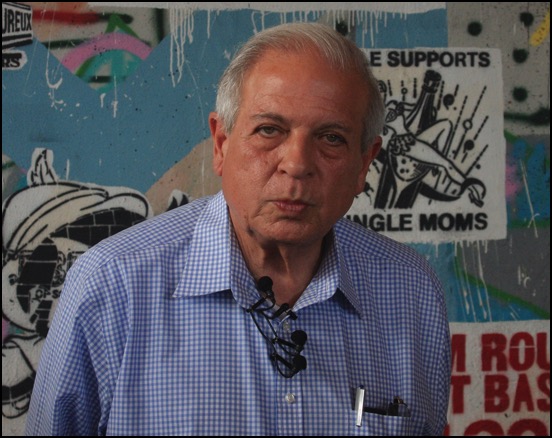
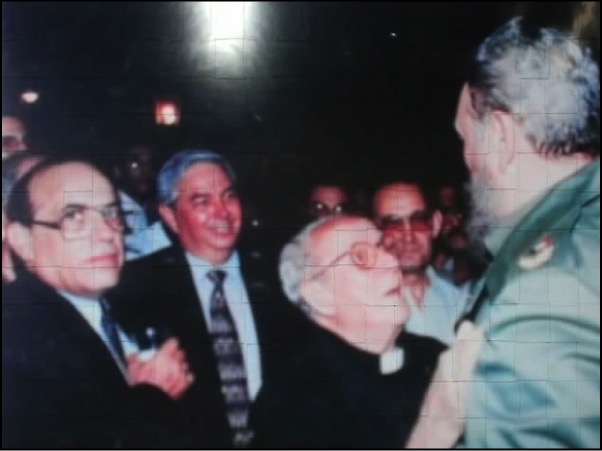
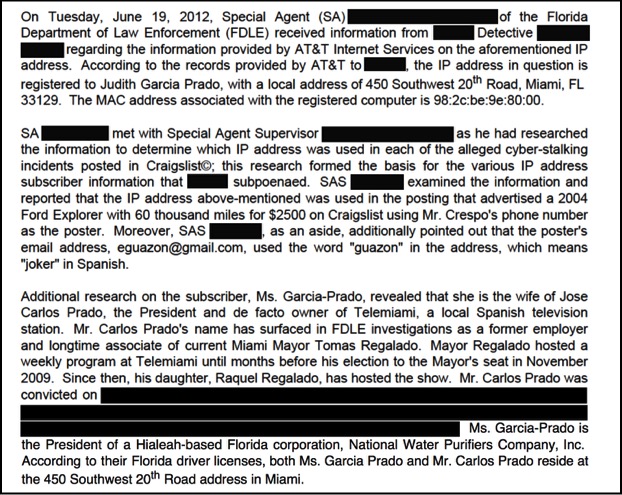
The case floundered and died over a procedural dispute between the FDLE and the local police department that I had been required to file my initial complaint with once they discovered that these relationships led back to the Mayor of Miami.
While Pardo was an exception, in that he was willing to go to Cuba and appear in a photo with Castro, it was the anti-Castro part of the exile community that Regalado has always considered his political base, and in instance after instance he's always attempted to exploite anti-Castro Cuban exile politics for his personal political gain.
At City Hall, his office was considered a hangout for various anti-Castro schemers and plotters, some of who in the 70's and early 80's believed that the best way to show their anger at what Fidel Castro was doing in Cuba was to blow up something, or someone in Miami.
During the time that Regalado has been in office he has always made sure that family and friends of a number of these people had a city job.
In 2011, Regalado went so far as to hire Luis Zuniga, a founder of Alpha 66, the anti-Castro paramilitary group alleged to have been involved in numerous bombings in Miami in the 1970's, and who spent 15 years in Cuban prisons for smuggling guns into the island as part of a scheme to overthrow Castro.
Regalado hired Zuniga to be a consultant to advice him on the city budget. In 2014, and paid him $71,236 from the Mayor's Office Expense Account.
Opponents of the Castro brothers weren't the only folks who Regalado had an affinity and attraction for. He also claimed to believe in the rehabilitative power of second chances for bad cops, and over the years hired several who'd gone to prison for engaging in criminal behavior while on the force.
One of those ex-cops was Pablo Camacho, who was convicted in the murder of small-time drug dealer Leonardo Mercardo by stomping him to death, and in Camacho's case "allegedly bludgeoning him with his police flashlight"
Years later, after he succeeded in having Police Chief Miguel Exposito fired, Regalado replaced him with Manny Orosa, who at the time of the Mercardo killing was the Sergeant in charge of the street level narcotics unit that included Camacho, and who, when faced with arrest for failing to secure the scene of the crime and allowing the 6 cops involved to leave so they could conspire on their story of what had happened, agreed to take an offer of "Use Immunity" by the Justice Department rather than be arrested. He became a government witness.
Orosa's appointment as Chief led to a number of internal management problems that now plague the department, not the least of which was allowing the hiring of the children of several of senior staff that became the most read story that I've written in the 6 plus years I've been writing this blog, as well as the recent revelations about evidence being stored in shipping containers under I-95.
It was the actions leading to the firing of Police Chief Miguel Exposito in September of 2011 however, that made me realize that these, and countless other incidents and decisions made by Regalado were like trees in a forest, and that in turn eventually convinced me that the City of Miami was in many ways being been run like an organized criminal conspiracy.
Orchestrating it all was the avuncular Tomas Regalado, who used his bumbling English as a second language, as a mask to deflect attention to the pandering and politically incendiary rhetoric he engaged in regularly on Latin radio and TV, and who did in fact behave as a political version of a mafia don.
He was, and is Miami's Gangster Mayor.
MAKING MAQUINUITAS LEGAL: THE GANGSTER MAYOR REVEALS HIS ALLEGIANCES
For as long as anyone can remember, the illegal gambling machines, known as maquinitas have been an integral part of the decor in many of the little corner grocery stores, laundromats, bars and gas stations throughout the poorer sections in the city of Miami.
In 2004, then Mayor Manny Diaz, realizing the impact that these machines had on the poor people who would sometimes stick their rent money in a machine in the hopes of a quick payout initiated a Quality Of Life Task Force and started an aggressive effort to confiscate these machines, rightly identifying them as a contributing to the poor qualify of life in many of these neighborhoods.
By the time that the final version of the ordinance came up for a vote, it had been drastically rewritten by Commissioner Francis Suarez, whose version made it impossible for any of the machines to ever be licensed because first, the owners would have to obtain a "state Amusement Machine certificate from the Florida Department of Revenue, as well as a county Business tax receipt."
In practical terms, this was a deal killer that continued to make the machines illegal within the city, and just days after the passage of the ordinance, Chief of Police Miguel Exposito, who had a long history of opposition to these machines being allowed to operate in the city - he was prominent in the 2004 video above - put together a plan of action to go after the maquinitas that were then operating in the city.
Part of that plan included not telling the Mayor or the Miami-Dade State Attorney before the start of the raids for fear of what they might do once they found out. Katherine Fernandez-Rundle had also demonstrated a soft spot for maquinita owners over the years.
The initial raids resulted in over 400 machines being confiscated, and 28 people arrested.
When Regalado learned about the raids he demanded that they be stopped, claiming that they would reflect badly on his administration in the upcoming elections.
The truth of the matter was that everyone believed that the real reason Regalado wanted the raids postponed until after the election had nothing to do with a reflection on the city, or the election, but because by postponing the raids it would have provided him with the opportunity to tip off the owners so that they could move all of the machines safely out of the city. It was his belief that Regalado would do just that that prompted Exposito not to tell him.
By late December, the Chief's continued efforts to seize even more maquinita machines prompted a backroom war of words that became public when Exposito sent Regalado a letter that included the following accusations:
"Through the Mayor's office there was a concerted effort
to interfere with the gambling enforcement operation. You,
as the Mayor have gone beyond the legal bounds of your
office."
EXPOSITO'S LETTER WAS THE CULMINATION OF A YEAR LONG SERIES OF INCIDENTS BETWEEN HIM AND REGALADO
While Exposito has never spoken directly about his reason for writing this letter, I believe that by the time he wrote it, he probably realized that his days as Chief were numbered, and that while his resentment over the fight about the maquinitas was significant, his fight with Regalado was also fueled by the outcome of some of the other decisions that had occurred since he became Chief which had come back to bite him in the ass.
Being the Chief of Police in Miami, like being the Chief in most, if not all major American cities, is as much a political job as it is a law enforcement job, and that often means that in order to become Chief you have to agree to certain conditions and make certain political compromises to whoever has the power to make you the Chief.
The first concession that Exposito obviously made, which didn't take long to blow up in his face was the corruption probe that he initiated after he became Chief. Regalado came into office wanting to create a reputation as a law and order kind of mayor, and it was Exposito's job to come up with the headline grabbing series of high-profile arrests that would create that image. The cases blew up when Katherine Fernandez-Rundle refused to prosecute most of the cases, which tells you just how badly those cases had to have smelled, because for Fernandez-Rundle to do anything against her dear friend Tomas, was almost like Brutus stinking the knife in Caesar.
The next concession that Exposito agreed to was the appointment of Regalado's Godson Luis Cabrera, to be the Deputy Chief of Police. At the time Cabrera was a just a Lieutenant, with a history of being a loose cannon. Within six months of becoming the Deputy Chief of Police, Cabrera's behavior became such a huge problem within the department, that after one explosive meeting where Cabrera broke down in tears and had to be escorted from Police headquarters, Exposito notified the Mayor that he would have to put Cabrera elsewhere, because as long as he was Chief he would never allow him to return to the department in any official capacity.
But by far the worst decision that he made, was based on a Regalado demand, made during his campaign for Mayor that the police department "get back to basics."
At the time, Regalado was opposed to the "community policing" that had been instituted by Chief John Timoney, and wanted the department to get tough on street crime.
The eventual result of this change in policy led to the killings of 7 young Black men in Miami's ghettos that were attributed to Exposito's support and efforts to put pro-active units on the street in an effort to deal with the gangs and drug dealers that were terrorizing Miami's Black neighborhoods. While there continue to be debates over the efficacy of both models in dealing with high levels of crime in poor communities, I believe that the real problem in this case was not so much the employment of tough, aggressive street units to deal with these problems - other major American cities seem to be able to do it and are able to control the behavior of the officers involved - but rather the problem, which continues to this day was the failure within the department to use intelligent manpower selection and competent management practices without being influenced by the political interference of both the Mayor and the City Commissioners.
The twin problems associated with what are known as the Family and Friends Plan and the Cuban Connection Advancement Plan have been the root cause of most of the major and minor scandals that have befallen the Miami Police Department since the River Cops cases of the 80's, and can be seen in the decision making that has led to the current problems with Chief Rudy Llanes, and the revelations about the current operation of the department.
In Exposito's case, his problems with the Black community once the shootings started, were exacerbated by an off-the-cuff comment Regalado made to a local latin TV station in August where he stated that when it came to dealing with Miami's street gangs his administration would respond to violence with violence.
In the summer of 2010, seven months after Regalado became Mayor, and according the the Miami Herald, after he had received "at least $14,000 in campaign contributions from video gaming industry leaders, their businesses and their families," he announced that he was reversing the city's long-standing position that these gambling machines were illegal by announcing that because of the financial crisis that the city was undergoing he had decided to license these machines as a way to help the city's financial crunch.
In order to achieve this goal, Regalado instructed Julie Bru, the City Attorney to draft a new ordinance that would allow up to 1000 machines to operate legally in the city by paying a $750 business tax and a $500 per machine registration fee.
To make sure that the ordinance was written correctly, a committee including business owners was formed to contribute to the writing of the ordinance.
Among the members of this committee was a Hialeah businessman named Orlando Cordoves, who it turned out was a representative of the maquinita owners. Cordoves was also a guy who in 2005 had been named in a federal indictment as being a member of the Cuban Mafia family known as "The Corporation," led by Jose Miguel Battle Sr.
While Cordoves' name was eventually removed from the federal indictment - for reasons that were never revealed - a copy of the indictment was released that identified him and described his alleged role in this organized criminal enterprise: (I originally wrote about Cordoves and several of his associates as part of a series about a former Miami Police officer named Placido Diaz. The federal indictment, along with other related documents that included another maquinita owner can be found HERE.)
According to the indictment, Cordoves was:
"...an associate of the CORPORATION and a
manager and operator of money laundering operations
for the CORPORATION who also conducted the
CORPORATION'S illegal operations and operator
of various businesses."
"Jefe" and a boss in charge of multiple Divisions in the
CORPORATION who was also responsible for identifying
new illegal gambling locations and for recruiting entry level
personnel to start up new gambling operations for the
corporation."
Cordoves' inclusion as a member of the committee gave a whole new meaning to the term, "business friendly," and revealed that Regalado was not only willing to allow a known associate of a major organized crime family involved in locating and operating illegal gambling establishments to have a say in the creation of legislation that would benefit him and his associates, but to actually allow him to do so as part of a committee chaired by the City Attorney.
It was an audacious act that revealed just how much influence the owners of these illegal gambling machines had over the Mayor of Miami, and more importantly, how willing he was to allow the "Little Peeple" that he had always talked about protecting from being victimized by the owners of these machines.
THE LUCKY 7 RAIDS
On October 14, 2010, by a 4 to 1 vote, the City Commission passed Ordinance 10-00739.
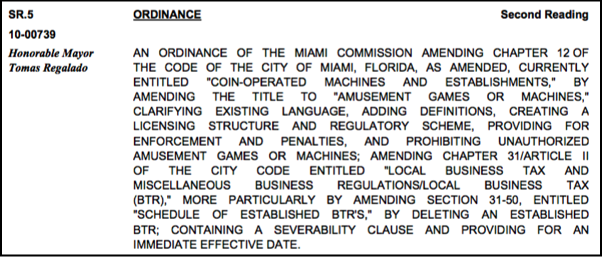
Exposito's December letter only served to set off a round of personal attacks against him by Regalado and the State Attorney, which intensified even more when Exposito and his head of Internal Affairs, Major Al Alvarez, decided to fight back and started appearing on local Latin TV talk shows taking turns bashing Regalado, and exposing his connections with Orlando Cordoves and another member of the Cuban Mafia, Thomas Cabrerizo.
In an effort to fight back, Regalado first turned to Commissioner Richard Dunn, a ghetto preacher turned politician with a history of exploiting his community and his campaign finances to act as his sock puppet in attacking Exposito over the killings in the ghetto as a way to try and get the Commission to fire him.
Dunn's attack focused on the promo for a TV reality show about department's pro-active units - Miami's police department has long been a staple of both reality and fictional TV shows including 48 Hours, Miami Vice and Bad Boys - but at the January 8th Commission meeting, Dunn's efforts to use the video failed.
THE STATE ATTORNEY NEEDED A FAVOR
An interesting aside, and one that did not come to light until a year later, was that during January of 2011 when so much of this street fight between Exposito, Regalado and Fernandez-Rundle was taking place, Fernandez- Rundle was having her staff lobby Regalado to get the Miami City Commission to name a portion of SW 12th Avenue after her.
The Florida Legislature had agreed to naming of a portion of a Miami Street after her in 2008, but the City Commission, for whatever reasons refused consider the request until Regalado pressed them in January of 2011.
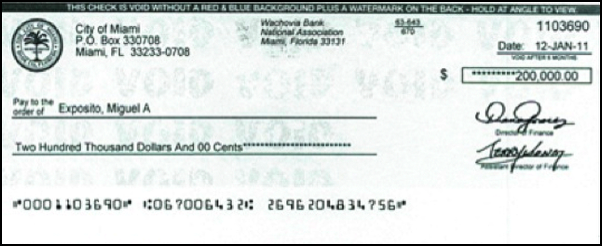
The real evidence supporting the claim that this check was part of a naked bribe offer was the fact that the Miami City Charter specifically stipulated that when it came to the City Attorney issuing checks from her settlement account, only the City Commission could authorize a payment of more than $25,000 from that account.
Once this effort became known, Regalado's efforts to get the City Commission to approve naming a portion of SW 12th Avenue for her led to a general belief that this favor became the Quid in a series of Pro Quo's that included allowing him and his daughter Raquelita, to evade criminal prosecution for campaign finance violations later in 2012, and for Fernandez-Rundle's efforts throughout the remainder of 2011 not only to side with Regalado against Exposito, but included her efforts throughout that summer to intervene directly in an effort to keep Michelle Spence-Jones from returning to the City Commission on September 1st, after a decision had been made to drop the remaining fraud charges against her after she had been acquitted of separate charges earlier in the year.
Because it was common knowledge that Johnny "The Doormat" Martinez had been appointed City Manager only on a promise that he would fire Expositio at the first opportunity, the fear was that if Spence-Jones was allowed to return in time to be part of the required Special Commission meeting that would take place whenever Martinez fired Exposito she might not vote to support his firing
Spence-Jones had never been shy about claiming that believed that Regalado had played a major role in having her indicted and removed from office, claims which were detailed in a 114 page lawsuit she filed against him, the State Attorney and several others in January of 2012.
The fear that she would support Exposito however, turned out to be unfounded - but a review of Fernandez- Rundle's email exchange with Spence-Jones' attorneys in July and August do provide a window into how far she was willing to involve herself directly in trying to change the agreement that her staff attorneys had negotiated with Spence-Jones' attorneys so as to keep her from returning to her position as a City Commissioner on September 1st.
EXPOSITO IS OFFERED $400,000 TO RESIGN
Regalado was always a politician quick to try and sweep anything that impacted negatively on him under a rug, and after Dunn's failure to get Exposito fired, he turned to his newly appointed City Manager Tony Crapp Jr., and the city's Chief Financial Officer, Larry Spring, to come up with a way to shut Exposito up. (It can get confusing in keeping track of the various City Managers that passed through City Hall during Regalado's first term, but they were in order: Carlos Migoya, Tonny Crapp Jr., Johnny Martinez, and finally Danny Alfonso. Tonny Crapp Jr. had served as Regalado's Chief aide when he was Commissioner, and was appointed City Manager in January of 2011. He resigned with a Golden Parachute in June of 2011.)
The decision reached by Regalado, Crapp and Spring was that Spring would approach Exposito and make him an offer of $400,000 if he would resign.
When he was approached by Spring, Exposito considered his offer to be the opening gambit of a bribe, and contacted the FBI.
In the days that followed, Spring and Exposito met or talked on the phone 13 times - all of which were recorded by a wire that Exposito wore - the transcripts of which I obtained after the case was closed through a series of public records requests.
Spring repeatedly offered Exposito two payments of $200,000 each if he would retire immediately, and Exposito kept countering by demanding that any payments would have to be made in a way that did not force him to pay taxes, thereby he and his handlers hoped, forcing Spring to show up with a bag of cash.
A cash payment could then be used as evidence to support a charge of bribery.
The deal broke down when Exposito was offered, and turned down, an offer of a $200,000 check because he wrongly believed at the time that the check could not provide evidence of a bribe.
Exposito's belief that the check offered by Spring would not provide the needed evidence of a bribe was because unknown to him or his FBI handlers, the check that Spring told Exposito he had ready for him to pick up was not from a regular city account, but rather from the City Attorney's settlement account, and because it came from her settlement account it would have been considered as a "settlement payment," not subject to taxes.
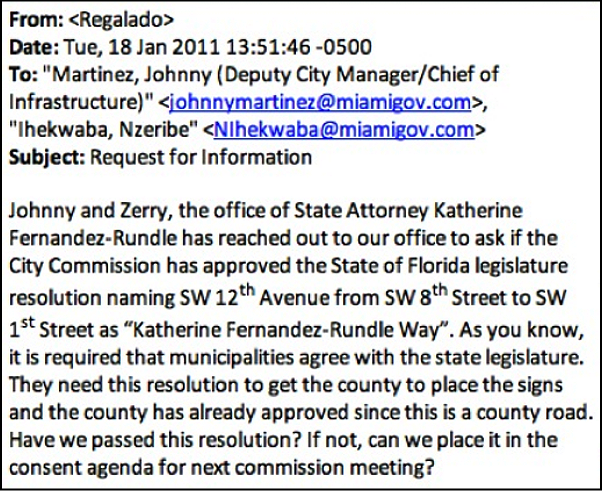
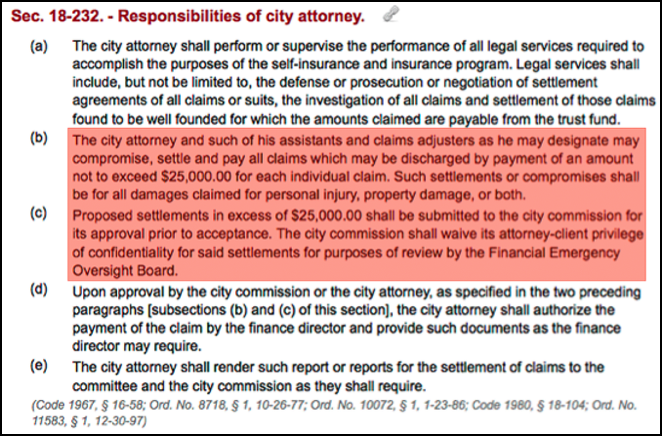
In short, this check was illegally written on a restricted account, and for an amount that violated the provisions of the City Charter.
This information was brought to light in July of 2012, when Commissioner Frank Carollo raised the issue during a City Commission meeting, and asked for an investigation of City Attorney, Julie Bru.
His fellow commissioners ignored Carollo's request, and the issue became one more example in a long list of examples of how the members of the Miami City Commission have ignored or brushed aside flagrant evidence of wrong doing over the years contributing to the perception that the City of Miami is not only corrupt, but that it's politicians are seasoned veterans in covering that corruption up. (For a detailed explanation of how the Exposito investigation was handled by the State Attorney's Office, including a copy of their Close Out Memo, as well as a copy of the Commission meeting video where Carollo requested that Bru be investigated, you can go HERE.)
A SUMMER OF DISCONTENT
After the revelations about the alleged bribe died down, the war of words between Regalado and Exposito continued in fits and starts, and when Tony Crapp Jr. resigned as City Manager, Regalado made it a priority that his replacement would be someone who would fire Exposito.
The appointment of Johnny "The Doormat" Martinez to replace Tony Crapp Jr. by Regalado in late June was quickly approved by the Commission, and then it became a question of not whether Martinez would fire Exposito, but when.
That opportunity came in August, when Exposito, in a back and forth with Martinez over his rights as Chief to make internal personnel decisions chose to demote 3 senior members of the department on charges of incompetence, failure to obey orders, and hanging out at Cuban Crafters, a cigar emporium on NW 7th Street, where an employee had been arrested twice in late 2010 for selling kilos of cocaine to undercover officers.
Martinez used these decisions to fire Exposito on September 6th, pending the required review by the City Commission.
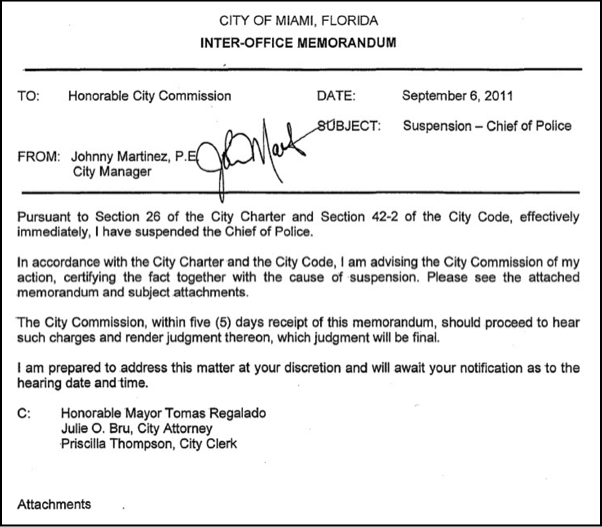
To comply with the 5 day rule cited in the Memo, a Special Meeting of the City Commission was set for September 9th, to decide whether the Commission would uphold the Manager's decision.
MY CLIENTS HAVE NO PROBLEM IN MY REPRESENTING THE CITY IN THIS MATTER
Of all the bizarre and crazy things that I've witnessed in the 6 plus years of writing this blog, I consider what took place at this Special Meeting to be the most reprehensible and crazy event to occur at City Hall during my time of writing about the antics taking place there.
It all had to do with the appearance of criminal attorney Alberto Milian - an attorney who at the time was representing the owners of the illegal gambling machines in the Lucky 7 court cases, and who is now a Circuit Court Judge - to take over presenting Martinez's case to the Commission as to why he wanted the City Commission to uphold his decision to fire the Chief.
As the City Manager, it was Martinez's responsibility to present his reasons for firing the Chief to the Commission and in the morning session of that meeting had done so badly that some people wondered whether he, instead of the Chief ought to be fired for gross incompetence.
Sometime during that morning session, as it became apparent that Martinez was incapable of explaining how he tied his shoes, much less why he had decided to fire the Chief, an emergency call was supposedly made to Alberto Milian to come to City Hall and take over making the Manager's case against Exposito.
To this day, no one knows who actually who made the call, or why, out of the thousands of lawyers in Miami-Dade County, including hundreds who had represented the city pro bono on any number of cases was the call made to Milian.
While the illegal gambling machines were not one of the reasons cited by Martinez as to why he chose to fire the Chief, the issue had none the less been at the core of the fight between the Chief and the Mayor for over a year, and it was no secret that it was the hundreds of illegal gambling machines that Exposito had seized and was then housing in a city warehouse that was at the center of the fight between them.
As a piece of surreal theater it is hard to envision a crazier situation then having a lawyer representing individuals engaged in criminal activity, claiming with a straight face, that his clients had assured him that they had no problem in his efforts to do everything he could to get their chief antagonist, the Chief of Police, fired.
In addition, while Milian claimed that his representation of the City Manager was a Pro Bono act, there lingers a question of whether he was actually paid by the owners of the illegal gambling machines after the fact for his efforts to get the Chief fired.
The Commissioners brightly accepted Milian's assurances that he was just doing the Lord's work, and went along with his argument that the Chief of Police needed to be fired to make Miami a city of laws once again.
After the charade of conducting a national search for a new Chief, Manuel Orosa, who had been appointed interim Chief the day after the Manager suspended Exposito, was appointed as the next Chief of Police, and as they say in the music biz, the beat went on.
BAD HABITS DIE HARD
In March of 2013, I wrote a new story about illegal maquinitas still operating inside the city limits, based in part on photos that Mike Hatami, a fellow blogger at the time, had taken of maquinitas in the cafeteria in the building that housed the radio station where Raquel Regalado did her show.
That maquinitas were again openly operating across the city - and in a cafeteria that Raquelita passed daily, and that the Mayor passed every time he showed up to be part of her radio show - only underscored the fact that the firing of Exposito was treated by the maquinita owners as a license to operate with impunity.
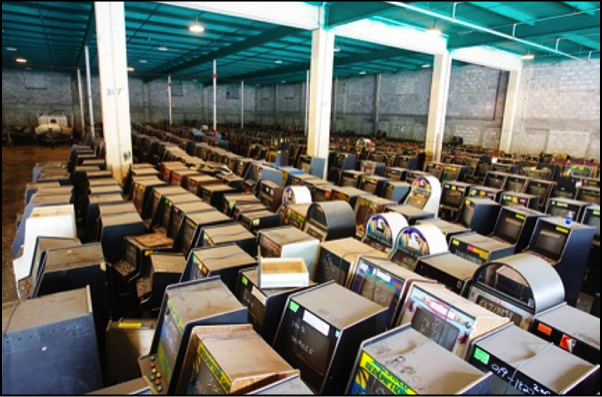
Milian's connection to the owners of the illegal gambling machines was not a secret, and that immediately raised a question of his having a conflict of interest, to which he responded in this 57 second clip from that hearing.

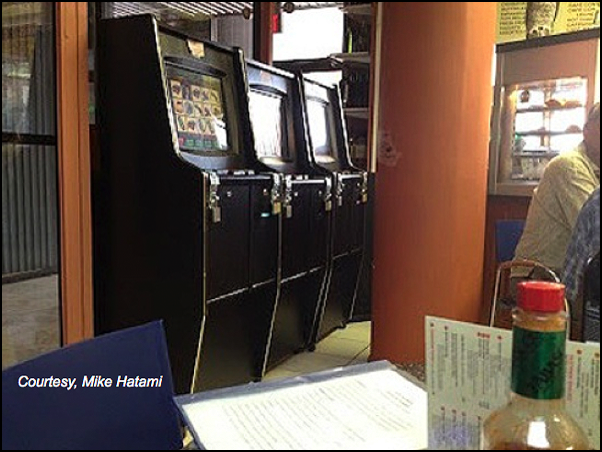
In April of 2013, after rumors started circulating that Regalado was under investigation by the FBI for allowing the maquinitas to continue to operate within the city, that Chief Orosa, who had knowingly stood by and allowed these machines to flourish in the city during the time he had been Chief, along with Regalado and Commissioner Frank Carollo held a press conference at the City's Solid Waste Department to announce a new series of raids against the maquinitas, and to provide a photo op for the news media of 48 machines set up on in the parking lot as Sacrificial Lambs waiting to be destroyed by a Backhoe.

Last week, as part of my story about the destruction of evidence stored in shipping containers under I-95, I included several photos of that storage area that revealed that maquinitas, unprotected from the elements are still being kept as evidence.
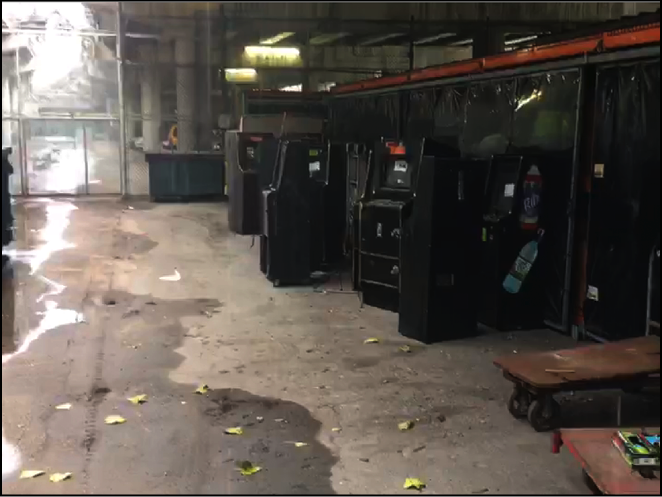
THESE ARE MAQUINITA MACHINES

These machines were supposedly seized in raids conducted in 2015 and 2016.
While for the most part maquinitas are no longer as prevalent as they used to be inside the city limits, they are now flourishing in Hialeah thanks to a crazy ruling by State Attorney Katherine Fernandez-Rundle, who issued an opinion that these machines are not illegal unless a cop catches someone actually getting a cash payout from a machine.
As a show of appreciation, alleged loan shark and Mayor of Hialeah, Carlos Hernandez was more than happy to serve as a co-host for one of Fernandez-Rundle's reelection fund raisers last April.
THE SKILLS NEEDED TO BE A GANGSTER MAYOR ARE THE SAME AS BEING A MAFIA DON
Tomas Regalado has continued to behave like a Gangster Mayor in the years since 2011, and as I continued to document those activities I came to appreciate how his behavior often mirrored the behavior of any leader of an organized criminal conspiracy.
The five rules for being a successful gangster Mayor, or mobster are:
First and foremost, both look on the public as suckers to be taken advantage of.
Secondly, both work hard at not being connected to their various criminal and/or illegal enterprises.
Thirdly, both are successful in corrupting, or co-opting law enforcement so as to evade indictment or prosecution.
Fourthly, if they haven't managed to evade being in the media spotlight, they've worked hard to create the most innocuous public image they can, and whenever possible they've used whatever opportunities present themselves to co-opt or exploit the news media.
Lastly, and this is really important, both never run out of followers willing to do their dirty work.
As a writer for the New York Times wrote at the time that the Miami Herald moved from it's bayside building to Doral, Miami is,"a city that produces a limitless number of crooked public officials, overeager developers and outlandish criminals,"
Even though he's not been arrested or convicted of any crimes - in no small part to the protection that he has received from Miami-Dade County's corrupt State Attorney Katherine Fernandez-Rundle - the fact of the matter is that there is ample evidence that he has engaged in not only questionable, but clearly criminal activities as the Mayor of Miami, and in a moment of rare honesty several years ago, Regalado, responding to a nasty deal forcing the city to pay taxes on the rental fees that the City was receiving from the owners of the Miami Marlin's blurted out:
"In Miami, all deals are bad deals."
What he failed to include in that admission was that he had been a party to making many of those bad deals, and that those deals revealed that the difference between Regalado and some of his fellow co-conspirators inside Miami City Hall and real gangsters, was that the real gangsters wished that they could be as brazen in ripping off the taxpayers as Regalado and his pals have been.
It truly is Miami, Bitches!
Copyright - All Rights Reserved 2016 (C)
CORRECTION: In the original version, I mistakenly implied that Jose Carlos Prado also owned the radio station that both regalado's worked at. That was incorrect. Prado only owned the TV station.